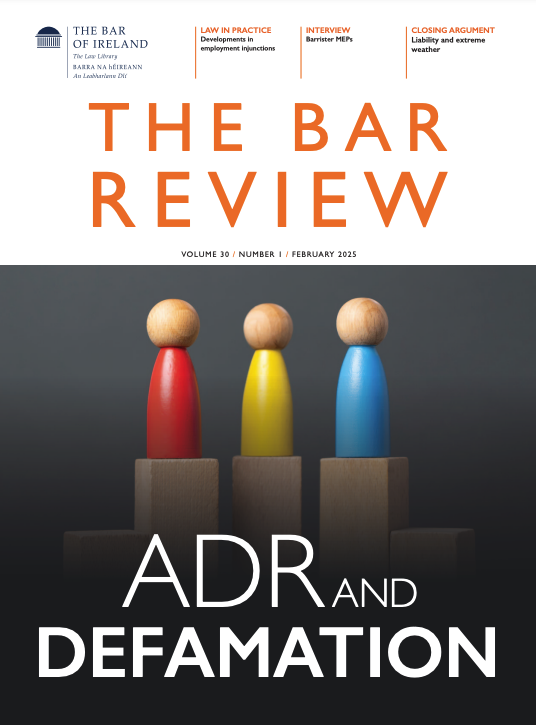Latest legal updates and news from the April issue of The Bar Review include: An interview with President of the High Court Mr. Justice David Barniville, Lorna Madden BL examines the opportunities within existing legislation to take action against polluters, and Tom Flynn SC delves into the Planning and Development Bill 2022 and its attempts to streamline planning legislation.
Highlights from April Issue
A Sense of Balance

President of the High Court Mr Justice David Barniville spoke to The Bar Review about his career, the need for more judges and resources, and improving access to justice.
Mr Justice David Barniville’s immediate background is not a legal one. Originally from Shankill in Co. Dublin, his parents were both doctors, but the family might better be described as having a sporting life. Both parents were tennis internationals, competing at Wimbledon and, in his mother’s case, the US Open. His mother also played squash for Ireland, reaching the top ten in the world. When it came time to choose his own career, however, he opted for a law degree at UCD, and says he chose to progress to the King’s Inns largely because, unlike the Law Society, no entrance exam was required at the time.
Challenging Water Pollution

With water quality in Ireland declining, it is heartening to know that existing legislation seems to provide an opportunity for individuals and organisations to take civil action against polluters.
When it comes to matters of the environment it can be easy to feel disheartened, and indeed, for an individual looking to litigate an environmental issue, there seems little to recommend Ireland as a jurisdiction. When it comes to water pollution, however, the news is not all bad. Whereas most areas of environmental law require individuals or environmental non-governmental organisations (eNGOs) to bring costly High Court actions relating to rights or issues of EU law, in relation to water pollution the existing law is relatively well equipped to allow for more straightforward and accessible litigation. In particular, a readymade cause of action for eNGOS and individuals alike already seems to exist in section 10 of the Local Government (Water Pollution) Acts 1977-2007.
Change of Plan

By Tom Flynn SC
While the Planning and Development Bill 2022 is a welcome attempt to clarify and streamline pre-existing planning legislation, certain provisions, in particular around judicial review, are likely to give cause for concern.
On January 26, 2023, the Government published the draft Planning and Development Bill 2022 (the Bill). It proposes a significant consolidation and amendment of the existing planning legislation contained primarily in the Planning and Development Act 2000 (as amended) (the 2000 Act). The 2000 Act has, by reason of multiple amendments over 23 years, become unwieldy and problematic to apply effectively, even for experienced lawyers. The Bill is a welcome and much-needed attempt to consolidate this important legislation.
Statute Barred

The winning entry to the Young Bar Article Competition looks at the potential reform of Section 9(2)(b) of the Civil Liability Act 1961.
This article will consider the legislative objectives of Civil Liability Act 1961 (the 1961 Act), the judicial interpretation of Section 9(2)(b), and how this affected the outcome of landmark cases. The article will then explore the recent case of GG v HSE and others,1 in which Ferriter J. observed that there was a “lacuna” in Irish law stemming from the rigid application of Section 9(2)(b) of the 1961 Act. The article will conclude by submitting that Section 9(2)(b) of the 1961 Act ought to be reformed in accordance with the recommendations of the Law Reform Commission in 2011.
Ending the Eviction Ban

The lifting of the so-called ‘eviction ban’ by the Government has provoked much debate on the thorny issue of tenants’ rights versus the property rights of landlords.
On October 29, 2022, the Residential Tenancies (Deferment of Termination Dates of Certain Tenancies) Act 2022 (the 2022 Act) was enacted. As the long title confirms, it was enacted as an “emergency provision to defer the termination dates of certain tenancies”, which would otherwise occur during the period from the passage of the 2022 Act to March 31, 2023. The acute national housing shortage that gave rise to the ‘eviction ban’ (as the relevant provisions of the 2022 Act have become known), is also acknowledged in the long title, which outlines the legislature’s aim to “mitigate the risk” that tenants would be “unable to obtain alternative accommodation” and to “assist in managing demand on housing services”. The provisions resemble those of the Residential Tenancies Act 2020, which imposed restrictions on termination of residential tenancies during the Covid-19 pandemic.
Download The Bar Review – Volume 28 Issue 2

